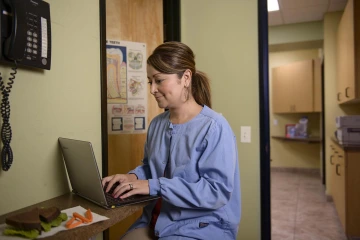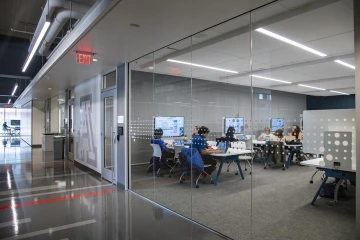Future Health Professionals Get a Dose of Financial Literacy
Financially proficient health care workers are better positioned to manage student debt and help patients overcome economic obstacles.

Armed with the tools of financial literacy, Health Sciences graduates can gain peace of mind for the future.
A new course on financial literacy will help ensure University of Arizona Health Sciences graduates can navigate the complex waters of personal finance, from student debt management to investment decisions.
The class is led by Terry Urbine, PhD, assistant professor at the Mel and Enid Zuckerman College of Public Health. With a background spanning the academic and corporate worlds, a doctorate in economics, and more than a decade teaching health economics and management classes at the University of Arizona, Dr. Urbine provides Health Sciences students a bridge to the world of personal finance — an unfamiliar realm for many prospective students. His course, “Health Profession Finance,” will launch in the fall and guide students through what is likely to be uncharted territory.

After graduation, health professionals often find themselves unprepared to manage financial matters, such as managing their student debts.
“This class provides the skills you need to address and manage every financial contingency you will face at school and after you graduate,” Dr. Urbine said. “Everything from buying a car, to making investment decisions, to paying off student loans, to saving money for your children’s college education — decisions that most adults have to face at some point.”
The new online course is part of the Health Sciences’ strategic initiative to minimize the debt burden for students by increasing their financial literacy and to expand cross-discipline collaborations.
The curriculum includes webinars featuring financial professionals whose expertise covers debt management, retirement funds, estate planning, investments, startups and philanthropy. It also will bring together students from the five colleges as part of interprofessional education events held in Tucson and Phoenix.
During the class, students will gain hands-on experience. The royalties Dr. Urbine receives from the personal finance textbook he wrote and uses to teach the class are earmarked for the Health Trade Fund, a unique aspect of the course that allows students, working in teams, to dip into a pot of money to practice making investments.
“I see that as an ongoing fund that the students will manage throughout the semester,” Dr. Urbine said. “We’ll use any monies we make for scholarships within Health Sciences.”
Empowering graduates with financial proficiency
Dr. Urbine hopes students will gain “peace of mind” from taking his class, adding that the stress caused by potentially crippling student debt can detract from learning.

Although the class is online, students in both Tucson and Phoenix will attend an in-person interprofessional education event to hear from experts and work through a case study.
“Knowing your student debt is manageable gives a person comfort. After this course, students will know there is a way forward through this forest,” Dr. Urbine said.
Dr. Urbine believes the “sudden onrush of cash flow” many new physicians and other recent Health Sciences graduates come into when they launch their careers makes them vulnerable to financial missteps.
“You go from being a student, who lives on $10,000 a year and barely making ends meet, to suddenly earning a six-figure income,” Dr. Urbine explained. “That makes you very susceptible to making mistakes, right away, with your adult financial decisions when you graduate.”
Some of those mistakes include falling prey to scams and risky investment propositions. Several Health Sciences alumni will share their personal experience in this domain.
Shining light on a taboo topic
More financially literate health care workers also may be better equipped to relate to patients who are struggling with financial stress.
Studies show that individual health care decisions are associated with different levels of personal finance. Poor nutrition, low physical activity and high stress are risk factors for many chronic diseases — and are exacerbated by poverty, leading to a vicious cycle linking low socioeconomic status and poor health.
“Finance has traditionally been sequestered away from any treatment decisions or options that are presented to patients,” Dr. Urbine said. But, as patients face problems related to medical bills, “we’re going to see more and more of that consciousness of cost.”
“I wish I had taken a class like this when I was younger.”Terry Urbine, PhD, instructor
Dr. Urbine gives the example of patients cutting their pills in half, which may happen when they can’t afford medications to treat chronic conditions such as diabetes. If a health care provider has a greater understanding of financial issues, they might have a better awareness of the obstacles a patient faces.
“Injecting discussions about cost into the clinical interaction with a patient is difficult, because it’s somewhat taboo to make these things financial decisions,” Dr. Urbine said.
Dr. Urbine says his own experiences have helped him build the course.
“I wish I had taken a class like this when I was younger, but I was like those people who think they know everything and didn’t need to be taught,” he said. “A school of hard knocks is very effective, but it can be costly.”

